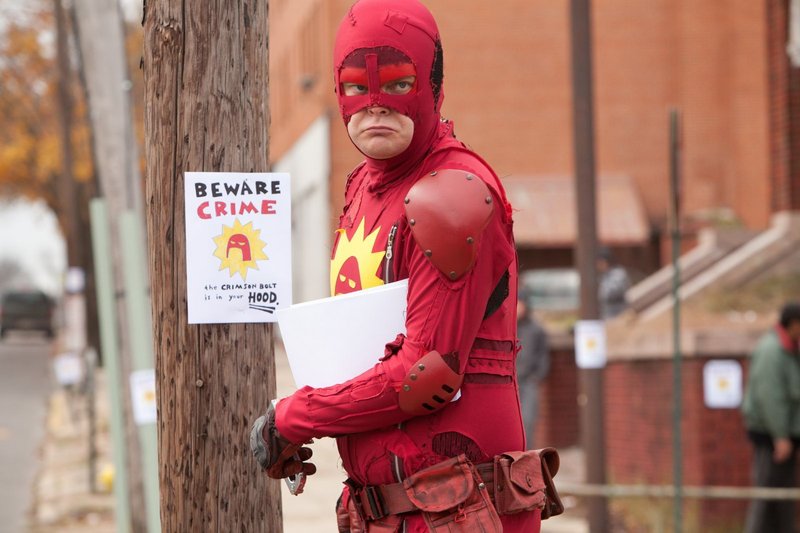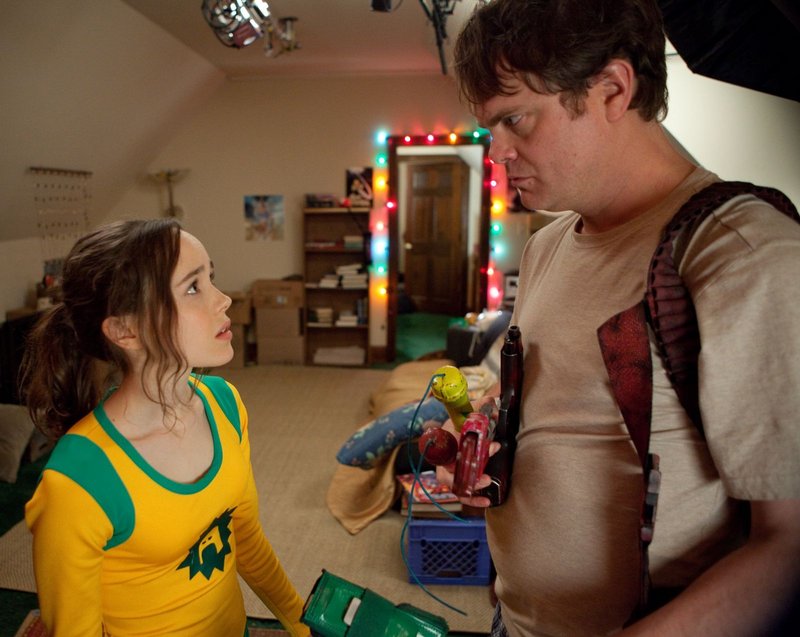LOS ANGELES – On a frigid Louisiana morning in 2009, in a house that reeked of cat urine, Rainn Wilson kneeled down on a bedroom floor and began to bellow at God. Sitting next to him, off camera, director James Gunn stared down at a small monitor and tried to contain his excitement as hot tears streamed down the face of the sputtering actor two feet away from him.
“It is so, so heartbreaking, but at the same time it’s really funny and people don’t know how to react to those things right next to each other, side by side,” said Gunn, best known as the writer-director of “Slither,” the 2006 comedy-horror film. “It was so uncomfortable, and that’s the playground I love to be in. It’s a scene that will change the way people look at Rainn Wilson. I know I was flabbergasted. Whatever you think of Rainn, it changes during that scene.”
Gunn and Wilson’s strange, subversive little film called “Super,” perhaps the most unsettling and endearing superhero film imaginable, is a kooky blend of “Taxi Driver,” “Donnie Darko” and “The Greatest American Hero” that aspires to be both heartwarming and (literally) skull-splitting. At the center of the film is Wilson, whom costar Ellen Page describes as “a revelation” in his role as an unhinged vigilante who calls himself the Crimson Bolt and uses a pipe wrench to bash in the heads of dope dealers, pedophiles and people who cut in line at the theater.
The 45-year-old Wilson’s previous film credits include “The Rocker,” “My Super Ex-Girlfriend” and “Monsters vs. Aliens,” but he is best known as the caddish, egomaniacal Dwight Schrute on the sitcom “The Office,” now in its seventh season. That isn’t about to change — the series pulls in 8 million or 9 million viewers for NBC on Thursday nights while “Super” is just a scruffy little indie film with a heretical spirit and a hard-earned R rating. The movie has an impressive supporting cast (Liv Tyler, Kevin Bacon and Nathan Fillion along with Page), but Wilson knows the movie is too fierce and jagged to be embraced by the wider popcorn constituency.
“You have tonal shifts from really sincere crying to animated sequences to hyper-violence to farcical comedy,” Wilson said. “It’s equal parts Travis Bickle and Napoleon Dynamite. I love all the different places the movie goes. There is a lot of it that you just don’t see coming.”
That’s an understatement. In a central scene in the film, his character is snatched up by mysterious tentacles and held captive while his cranium is cut open like a soup can so the giant, glowing finger of God can tap the top of his brain. For the record, Wilson says audiences shouldn’t be too alarmed by that scene: “It’s not a true story, just so you know.”
The movie, written by Gunn in 2002, follows the story of Frank D’Arbo (Wilson), a short-order cook who loses his recovering-addict wife, Sarah (Tyler), to a sleazy strip-club owner and low-level crime boss named Jacques (Bacon) who plies her with dope and double-talk. But like Joan of Arc, Frank gets a message from God — as well as a Christian broadcasting personality played with deadpan delight by Fillion — that takes him to a conclusion popular in contemporary American film: He will wear a mask and fight crime.
Superhero cinema is all the rage. It’s a function of Hollywood’s need for the kind of big-screen spectacle that can coax audiences away from home theaters, and it’s the ideal use of computer-generated visual effects able to convince moviegoers that a man can fly. Poking fun at the tropes is a natural reflex of our collective masked-man fatigue. “Hancock,” “Kick-Ass,” “Defendor,” “Sky High,” and “Special” are a few of the caped satires and sendups in recent years, but none of them — not even Matthew Vaughn’s bloody “Kick-Ass” — are as edgy as “Super.”
“‘Super’ feels, somehow, part of the real world, unlike a lot of these movies that have a sort of similar theme,” Wilson said. “I’m so happy to be in this film.”
It was Jenna Fischer, Gunn’s ex-wife and Wilson’s costar on “The Office,” who put the actor together with the role. The script had sat on a shelf for seven years, but Fischer’s affection for it never waned. One day on the set of “The Office” she told Wilson that he would be ideal for the part and texted Gunn to send the script over. The actor was 28 pages in when he reached a decision. “My hands were shaking,” Wilson said.
It was 2009, though, and the independent film scene was in a grim funk. The director and actor struggled to find supporters and finally got Ted Hope (“The Ice Storm”) and Miranda Bailey (“The Squid and the Whale”) on board. The movie was filmed in under 20 days, and Gunn said the urgency and discomfort of the shoot added to the jangled-nerves vibe of the film. “There was a culture of speed,” Wilson said. “We were doing 30 setups a day. It gave everything an edge.”
After screenings in Toronto and Austin, Texas, reviews have been mostly good (The Hollywood Reporter called it “a giddily over-the-top, super-entertaining goof … that deserves to realize its cult calling”), but the film is divisive. When Wilson went on “The Tonight Show With Jay Leno,” it was clear the host didn’t know what to make of his guest’s new film. Gunn couldn’t contain his glee while watching the awkward conversation. “My movie mind-gamed Jay Leno. What’s better than that?”
Send questions/comments to the editors.




Comments are no longer available on this story